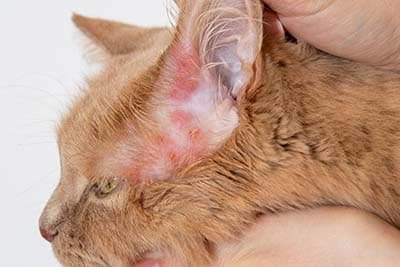Family pets hold a special place in family life, just like human family members, because they develop various skin and coat issues as they age. Skin disease creates both physical distress and functional disruption while serving as a potential source for developing more serious medical conditions when untreated.
The combination of hot weather, frequent sandstorms and high humidity in Dubai creates an environment where pets encounter allergens continuously, which leads to skin problems. The Vet needs immediate attention to treat skin issues, which range from mild allergic reactions to persistent infections.
At Modern Vet, we understand pets are essential family members, so we prioritise their skin health. Our veterinary dermatologists use their extensive training along with modern diagnostic tools to deliver compassionate care, which results in the best possible health for your pet’s coat and skin.
Key Reasons Why Your Pet Needs Dermatology Care:
Identify The Root Cause Of Persistent Itching Or Hair Loss
Protect Your Family From Zoonotic Skin Diseases
Treat Allergies, Infections, And Hormonal Skin Disorders
Improve Your Pet’s Coat Health And Appearance
Prevent Chronic Discomfort And Painful Hot Spots
Prevent Secondary Complications From Self-Scratching
Detect Underlying Issues Like Hypothyroidism Or Cushing’s
Receive Accurate Diagnosis Through Advanced Testing
Stop The Spread Of Contagious Conditions Like Ringworm
Benefit From Modern Vet’s Specialized Dermatology Expertise
Manage Yeast And Bacterial Infections Effectively
Restore Comfort, Confidence, And Quality Of Life

Why Specialized Pet Dermatology is Needed
Pet owners fail to understand the essential role professional dermatology services play for cats, dogs and other small animals. The majority of skin issues require professional attention because they indicate more serious problems than minor cuts or seasonal coat shedding.
- Recurring allergies or environmental sensitivities
- Endocrine disturbances interfering with normal skin processes
- Infections from skin wounds that aren’t treated
- Infectious diseases transmissible to humans, such as fungal infection (ringworm)
The quality of life suffers substantially because of skin problems. A dog with allergies that causes persistent itching will develop open sores, hair loss and behavioral changes because of continuous pain. A cat suffering from mites will exhibit persistent head shaking while also stopping grooming activities and refusing affection because of pain.
The trained veterinary dermatologists at Modern Vet possess the ability to identify causes beyond superficial skin symptoms. The combination of tests, lab work, and advanced imaging techniques allows them to identify the root cause so that the treatment becomes effective and remains effective for multiple years. The treatment method eliminates both pain and prevents future occurrences of the problem.
Key Symptoms of Pet Skin and Coat Problems
The following list contains common signs which show your pet requires a visit to the Vet:
- Ongoing scratching or itching behavior which persists, particularly in multiple areas, may indicate flea or mite infestations, allergic reactions or chronic dermatitis in your pet. The non-stop itching of the skin creates pain and can lead to skin tears that result in infections.
- The appearance of redness that spreads across the skin surface typically indicates allergic reactions, together with insect bites and infections. The skin area typically shows both redness and swelling, as well as heat and tenderness when touched.
- The condition known as alopecia leads to hair loss in specific areas on the body because of ringworm infection, hypothyroidism, hormonal disorder or stress-induced excessive grooming or allergy-related severe itching.
- Dry or Flaky Skin: Scales that are harmless-looking but perhaps due to a poor diet, lack of essential fatty acids in the diet, dehydration, or environmental factors such as very dry air from air conditioning.
- The presence of any growths on your pet’s skin, whether they are soft or hard, needs immediate veterinary evaluation. The majority of lumps appear as benign cysts or lipomas, but veterinarians must examine them because they could potentially be tumors or abscesses that need prompt attention.
- Raised Patches or Rashes: Allergic dermatitis or direct contact with causative irritating agents such as some plants or household items. In extreme cases, it may become wet, painful, and develop hot spots.
- Unpleasant Odor of Skin: A strong, unpleasant smell is not typical. The reason behind this issue can be traced to yeast overgrowth or bacterial infection alongside insufficient skin air circulation in wrinkly breeds.
- The prolonged chewing and licking produce sores, hot spots and increased inflammation.
- Skin Coloring: Skin darkening (hyperpigmentation) develops due to chronic inflammation or skin rubbing, but skin lightening suggests scarring or pigment loss because of autoimmune disease.
- The symptoms of red ears, combined with excessive wax and foul odors and head shaking, point towards mites, yeast, bacterial infection or allergies.
- Nail or Paw Changes: Cracked paw pads, swelling of the nails, or brittle nails are most often associated with fungal infections, autoimmunity, or malnutrition.
Possible Causes of Dermatological Diseases in Pets
Multiple elements usually work together to create skin problems in pets, which makes a veterinary evaluation necessary for proper diagnosis. The evaluation process at Modern Vet includes examination of all possible contributing factors.
At Modern Vet, we investigate all potential contributors, including:
Allergies:

- Flea Allergy Dermatitis (FAD) causes extensive skin irritation that persists for weeks after a single flea bite affects sensitive pets.
- The combination of seasonal pollen, dust and mold spores in Dubai leads to repeated allergic reactions.
- Food Allergies: Food proteins or grains in a pet’s diet may lead to persistent ear infections and skin irritation, which are often overlooked.
Parasites:
The presence of fleas, ticks, lice, and mange mites causes both skin discomfort and disease transmission, as well as severe allergic responses.
Fungal Infections:
- Ringworm: Causes circular bald patches and scaly skin. The disease spreads easily between humans and other animals.
- Yeast Dermatitis: Thrives in humid conditions, particularly in skin folds of breeds like Bulldogs or Shar Peis.
Bacterial Infections:
Allergies and open wounds typically lead to bacterial infections. The symptoms of this condition include pustules, crusts and oozing sores which emit a foul smell.
Hormonal Disorders:
The combination of hypothyroidism and Cushing’s disease creates conditions that affect hair development and oil secretion while weakening the immune system, which makes skin more susceptible to damage.
Nutritional Deficiencies:
A diet that lacks vitamins A, E, zinc and omega-3 fatty acids will result in poor coat quality and dry, itchy skin.
Genetic Predispositions:
The natural tendency of certain breeds to develop allergies leads Retrievers to experience allergies and Persian cats to develop fungal infections.
Environmental Factors:
The combination of harsh grooming products with lawn chemicals and specific grasses creates skin irritation for pets.
Autoimmune Disorders:
The immune system of pets mistakenly attacks healthy skin cells, which results in the formation of sores and changes in skin pigmentation.
Stress & Psychological Factors:
Pets develop self-inflicted skin damage through compulsive licking or chewing when they experience anxiety or boredom, or when their environment undergoes changes.
Services Offered At The Dermatology Department Include:
Diagnosis & Treatment Of Skin, Coat & Ear Conditions
Nutritional Consultations For Optimal Skin Health
Allergy Testing & Personalized Management Plans
Tailored Long-Term Care Plans For Chronic Skin Issues
Treatment For Bacterial, Fungal & Parasitic Infections
Medicated Baths & Therapeutic Topical Treatments
Skin Biopsy, Cytology & Advanced Diagnostics
Ear Cleaning, Infection Treatment & Maintenance
Management Of Autoimmune & Hormonal Skin Disorders
Collaboration With Internal Medicine & Surgery Teams
Flea, Tick & Mite Prevention & Control Programs
24/7 Access To Expert Veterinary Dermatology Support At Modern Vet

Our Dermatology Evaluations at Modern Vet
During dermatology visits at Modern Vet, you receive a detailed evaluation that caters specifically to your pet. The entire process follows a deliberate structure to avoid missing any essential details:
- History-Taking: The staff conducts an interview with your companion regarding their lifestyle, along with dietary information, environmental data, travel experiences, grooming practices, past health events, and treatment protocols.
- Physical Exam: The evaluation includes a complete examination of the coat and skin, together with ear and nail assessment and mass palpation, as well as parasite detection and assessment of hydration and elasticity.
- Allergy Testing: Blood tests and/or intradermal testing to find food or environmental allergens.
- Cytology & Cultures: Skin scrapings and swabs are taken to be analysed under the microscope for mites, bacteria, and yeast.
- Skin Scrapings & Biopsies: The laboratory conducts examinations of tiny tissue samples to diagnose persistent or atypical skin lesions.
- Advanced Imaging: To search for systemic diseases, X-rays or ultrasound imaging may be necessary when deep tissue involvement is present.
- Personalised Treatment Plan: We develop a tailored approach that merges medical interventions with dietary adjustments, along with lifestyle adjustments, to achieve immediate relief and sustained prevention.
Modern Vet Treatment
Modern Vet provides comprehensive treatment for both symptoms and root causes of skin diseases. Our diagnostic results will determine which treatments to administer.
- Topical Treatment: Medicated shampoo, antimicrobial wipes, or soothing spray to decrease itch and regulate infection.
- Injectable or Oral Medications: Antibiotics treat bacterial infections, and antifungals combat ringworm or yeast infections, while antiparasitic medications control fleas/ticks/mites and corticosteroids or Apoquel treat itchiness alongside immune-modulating drugs used in autoimmune cases.
- Nutritional Management: Hypoallergenic or dermatology-supportive diets receive omega-3 fatty acids and vital vitamins as supplemental additions.
- Parasite Prevention: The Dubai climate requires year-round flea, tick and mite prevention measures.
- Allergy Immunotherapy: The process of allergy shots or oral drops helps pets develop tolerance to particular allergens through gradual desensitisation.
- Surgical Treatment: Removal of the tumor, drainage of abscess, or biopsy for analysis.
- Long-term Skin Care Plans: We create ongoing maintenance plans for breakouts prevention and optimal skin health to support pets with chronic conditions.
Conclusion
Skin health forms an integral part of your pet’s total wellness. Early detection and proper treatment of even a mild rash, persistent scratching or severe skin condition leads to significant improvements in your pet’s life comfort and quality.
Our team at Modern Vet provides full dermatology care through state-of-the-art diagnostic techniques, individualized treatment approaches and compassionate care. Our purpose remains straightforward: to achieve the best possible health and well-being for your pets and to give you complete peace of mind.
When your dog or cat displays skin irritation symptoms, do not wait any longer. Bring your pet to our veterinary dermatologists today for the comfort they need. Contact Modern Vet Dermatology Services through our phone number or make an appointment to receive proper care.
FREQUENTLY ASKED QUESTIONS
Learn more about "DERMATOLOGY"








































